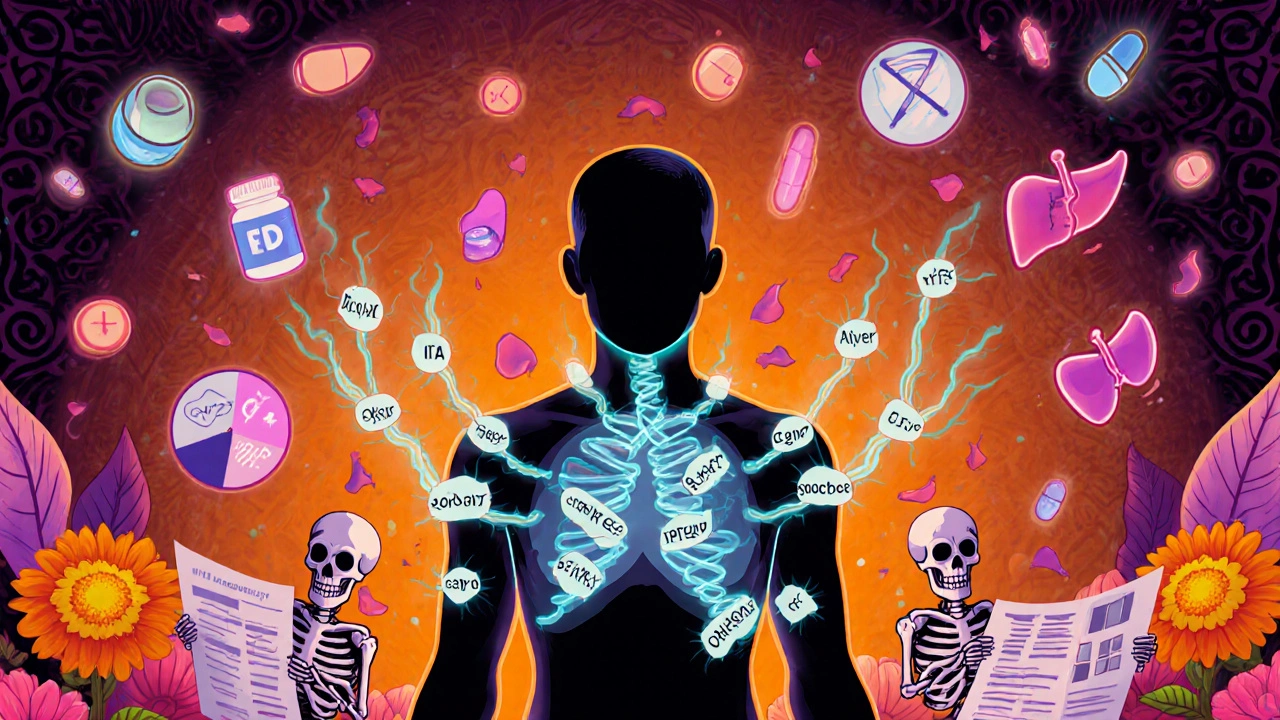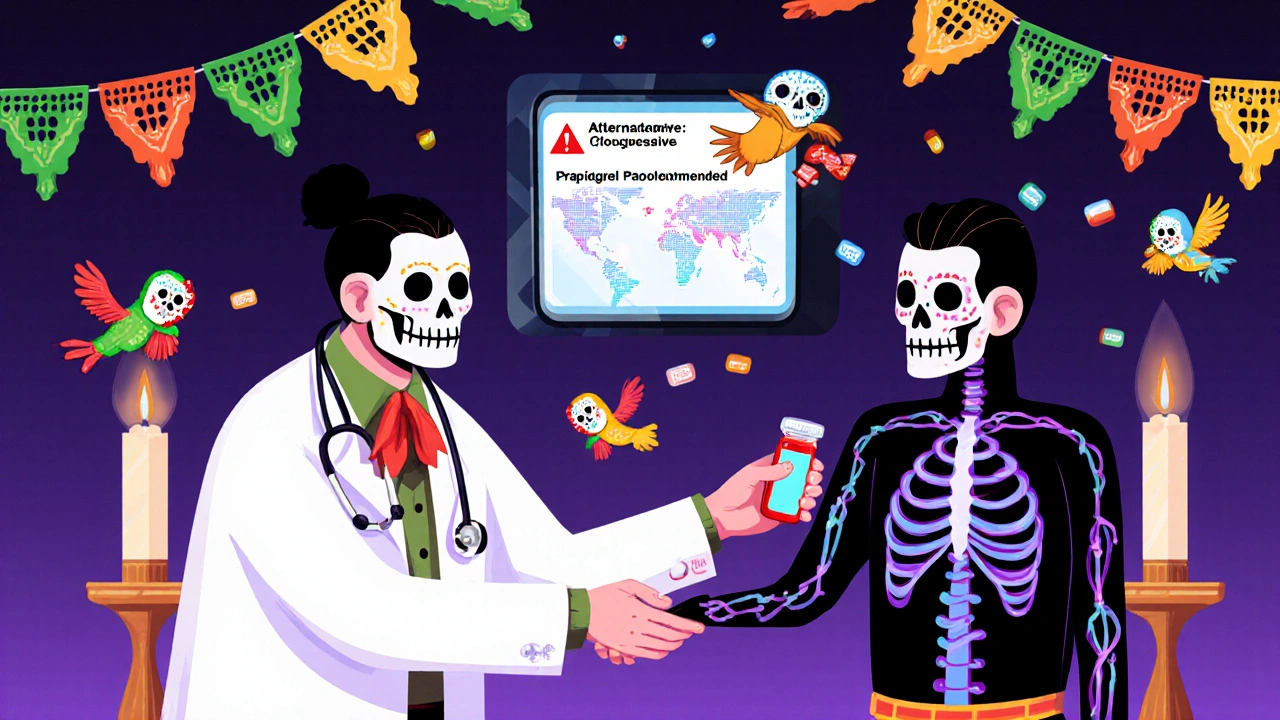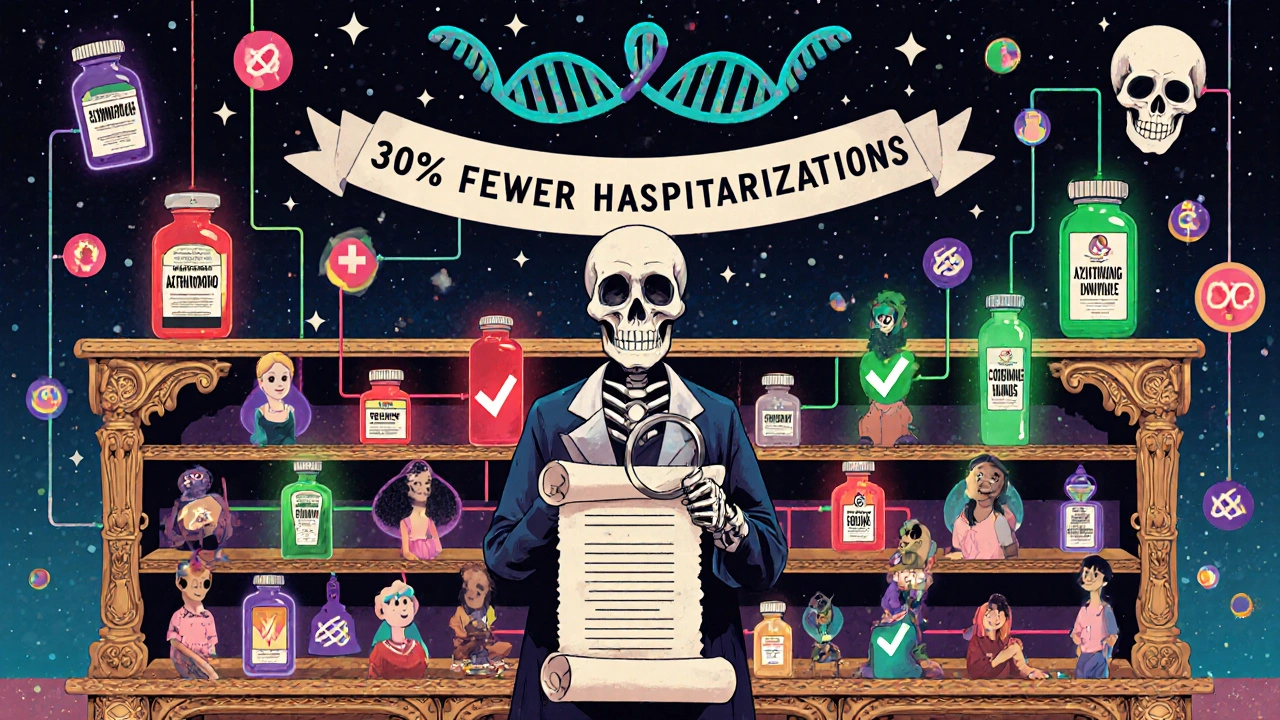Preventing Adverse Drug Reactions with Pharmacogenetic Testing
 Nov, 20 2025
Nov, 20 2025
Every year, hundreds of thousands of people end up in hospitals not because their condition got worse, but because the medicine meant to help them made things worse. These are called adverse drug reactions-unexpected, harmful responses to medications that aren’t caused by overdose or misuse. In Australia, the UK, and the US, ADRs account for up to 7% of all hospital admissions. That’s not a rare glitch. It’s a systemic problem. And the solution isn’t more caution or better warning labels. It’s genetics.
How Your Genes Decide How Your Body Handles Medicine
Your body doesn’t process every drug the same way. Two people taking the same dose of the same medication can have completely different outcomes. One feels better. The other ends up in the ER with liver damage, a dangerous skin rash, or dangerously low blood cell counts. Why? Because of small differences in their DNA. Pharmacogenetic testing looks at specific genes that control how your body breaks down and responds to drugs. The most studied of these are the CYP enzymes-especially CYP2C19, CYP2D6, and CYP2C9. These are like the body’s drug-processing factories. If your version of the CYP2C19 gene makes you a slow metabolizer, drugs like clopidogrel (used after heart attacks) won’t work. If you’re an ultra-rapid metabolizer, codeine can turn into too much morphine, risking respiratory failure. This isn’t theoretical. In 2008, the FDA warned that people of Southeast Asian descent carrying the HLA-B*1502 gene variant could develop life-threatening skin reactions from carbamazepine, a common epilepsy and bipolar drug. Testing for that single gene before prescribing cut the risk of Stevens-Johnson syndrome by 95% in those populations. That’s not a small win. That’s a game-changer.The PREPARE Study: Proof That Testing Saves Lives
In 2023, the largest real-world trial ever done on this topic published its results in The Lancet. Called PREPARE, it followed nearly 7,000 patients across seven European countries. Before they were prescribed any new medication, they got a single blood test that checked 12 key genes linked to over 100 commonly used drugs. The results? A 30% drop in serious adverse drug reactions. That’s not a 30% reduction in minor side effects. That’s fewer heart attacks, fewer liver failures, fewer hospital stays. The study used a panel that included genes like TPMT (for azathioprine, used in autoimmune diseases), DPYD (for chemotherapy drugs like 5-FU), and SLCO1B1 (for statins). For example, patients with a DPYD variant who got standard doses of 5-FU had a 60% chance of severe toxicity. With testing, that dropped to near zero. What made PREPARE different? It wasn’t done after a reaction happened. It was done before the first dose. That’s called preemptive testing. And it worked far better than reactive testing-where you test only after someone gets sick. Reactive testing only reduces ADRs by 15-20%. Preemptive testing? 30%. That’s the difference between hoping you catch it early and stopping it before it starts.Which Drugs Are Most Affected?
Not every medication needs genetic testing. But for some, it’s become standard of care. Here are the top 5 where testing makes the biggest difference:- Clopidogrel (Plavix) - Used after stents or heart attacks. About 30% of people have a CYP2C19 variant that makes the drug ineffective. Testing prevents strokes and heart attacks.
- Azathioprine (Imuran) - Used for Crohn’s, lupus, and transplant patients. TPMT variants can cause fatal drops in white blood cells. Testing cuts that risk by 78%.
- Codeine - Turns into morphine in the body. Ultra-rapid metabolizers can overdose on a standard dose. Children and breastfeeding mothers are especially at risk.
- Statins (like simvastatin) - SLCO1B1 variants increase the risk of muscle damage. Testing helps avoid the painful, sometimes permanent side effect called rhabdomyolysis.
- 5-Fluorouracil (5-FU) - A common chemo drug. DPYD variants can be deadly. Testing is now required in the EU before treatment starts.

Cost, Access, and Real-World Barriers
The test itself costs between $200 and $500 in the US, depending on the panel. In Australia, some private insurers cover it, and Medicare may cover it for specific cases like cancer or heart disease. But cost isn’t the biggest hurdle. It’s access and knowledge. Only 37% of doctors feel confident interpreting pharmacogenetic results. Many don’t know what to do with a result that says “intermediate metabolizer.” Is that a dose reduction? A different drug? A warning? The Clinical Pharmacogenetics Implementation Consortium (CPIC) has clear guidelines for 34 gene-drug pairs, but most clinics don’t have them integrated into their electronic records. In the PREPARE study, 42% of clinicians said they struggled to fit the results into their workflow. They got the report, but didn’t know how to act on it. That’s why successful programs-like the one at University of Florida Health-don’t just hand out test results. They build clinical decision support systems. When a doctor prescribes clopidogrel to a patient with a CYP2C19 poor metabolizer variant, the EHR pops up a warning: “Alternative: Prasugrel or Ticagrelor recommended.” It’s not enough to test. You have to act.What About Privacy and Equity?
Some patients worry about genetic privacy. Will this data be used by insurers? Will it affect future coverage? In Australia and the US, laws like GINA (Genetic Information Nondiscrimination Act) prevent health insurers from using genetic data to deny coverage. Life insurance is a different story, and that’s a real concern. Even bigger: most genetic data comes from people of European descent. If you’re of African, Indigenous, or Asian ancestry, your variant might not be well-studied. That means the test might miss something important-or give a misleading result. The NIH’s Pharmacogenomics Research Network is working to fix that, adding over 120 new variant-drug links from underrepresented populations in 2024 alone. But progress is slow. Equity isn’t just ethical-it’s practical. If pharmacogenetic testing only works well for one group, it widens health gaps. The goal isn’t just to test more people. It’s to test the right way for everyone.
Where This Is Headed
The future isn’t just about single genes. It’s about combining dozens of genetic signals into polygenic risk scores. Early studies show these can predict drug response with 40-60% more accuracy than single-gene tests. Imagine a test that doesn’t just say “you’re slow at metabolizing statins,” but “your overall risk for muscle damage from this drug is 82% higher than average.” That’s coming within the next few years. The FDA now lists 329 gene-drug pairs with clinical relevance-up from 287 in 2022. The European Union is investing €150 million to roll out preemptive testing nationwide by 2027. In the US, 87% of major academic hospitals plan to offer it by 2026. The cost is also falling. A pilot project by Thermo Fisher showed point-of-care PCR tests could bring the price down to $50-$100 by 2026. That’s less than a single emergency room visit for a preventable reaction.What You Can Do Now
If you’re taking multiple medications, have had a bad reaction before, or are about to start a new one-especially for heart disease, mental health, cancer, or chronic pain-ask your doctor:- Is there a pharmacogenetic test for this drug?
- Has it been shown to reduce serious side effects in people like me?
- Will the result be integrated into my medical record so future doctors see it?
What is pharmacogenetic testing?
Pharmacogenetic testing analyzes your DNA to see how your body is likely to respond to certain medications. It looks at specific genes that control drug metabolism, absorption, and effect. The goal is to predict whether a drug will work well, cause side effects, or be ineffective-before you take it.
Which genes are tested in pharmacogenetic panels?
Commonly tested genes include CYP2C19, CYP2D6, CYP2C9, CYP3A5, TPMT, DPYD, SLCO1B1, and HLA-B. These genes affect how your body processes over 100 medications, including antidepressants, blood thinners, painkillers, and chemotherapy drugs. The PREPARE study used a 12-gene panel covering 50 key variants.
Is pharmacogenetic testing covered by insurance?
In the US, Medicare and some private insurers cover testing for specific high-risk pairs like CYP2C19 before clopidogrel or TPMT before azathioprine. In Australia, coverage is limited but expanding-some private health funds cover it for oncology or psychiatric medications. Always check with your provider and ask if the test is medically necessary.
Can pharmacogenetic testing prevent all adverse drug reactions?
No. It prevents only those caused by genetic differences in drug metabolism or response. Many ADRs are caused by drug interactions, allergies, kidney or liver disease, or incorrect dosing. Pharmacogenetics doesn’t replace careful prescribing-it makes it smarter.
How long does it take to get results?
In modern clinics, results typically come back in 24 to 72 hours. Some hospitals now use rapid point-of-care tests that give results in under 2 hours. The turnaround time depends on the lab and whether the test is done preemptively or after an adverse reaction occurs.
Is pharmacogenetic testing only for people who’ve had bad reactions?
No. The most effective approach is preemptive testing-doing it before any drug is prescribed. Studies show it reduces adverse reactions by 30%, compared to only 15-20% with reactive testing (after a reaction). Testing once can guide treatment for your entire life.
Will my genetic data be shared with insurers or employers?
In Australia and the US, health insurers cannot use your genetic data to deny coverage or raise premiums under GINA and similar laws. However, life, disability, or long-term care insurers may still ask for genetic test results. Always ask how your data will be stored, who has access, and whether it will be deleted after use.
Elaina Cronin
November 21, 2025 AT 13:16While the data presented is statistically compelling, the ethical and logistical implications of widespread pharmacogenetic screening remain grossly under-addressed. The assumption that genetic data can be isolated from broader systemic inequities is not merely naive-it is dangerous. We are deploying a high-tech solution to a low-tech problem: the absence of comprehensive, equitable healthcare infrastructure. Without universal access, this becomes a luxury for the privileged, not a public health imperative.
Willie Doherty
November 22, 2025 AT 17:28The PREPARE study’s 30% reduction in ADRs is statistically significant, yet methodologically flawed. The cohort was predominantly of European descent, and the clinical decision support system was tightly integrated with academic EHRs-conditions not replicable in community hospitals or rural clinics. The effect size collapses when extrapolated to real-world settings where clinicians lack training, time, or resources to interpret pharmacogenomic reports. This is not implementation-it’s performance art.
Darragh McNulty
November 23, 2025 AT 18:23This is literally life-changing stuff 😍 I had a cousin who nearly died from a statin reaction-turns out she had the SLCO1B1 variant and no one ever tested her. Now my whole family got tested! My mom’s on a different cholesterol med and feels amazing. Seriously, if you’re on more than 3 meds, just get the test. It’s like having a cheat code for your body 🧬💪 #GeneticsSaveLives
David Cusack
November 24, 2025 AT 14:04One must question the epistemological validity of conflating pharmacokinetic variability with clinical efficacy. The CYP enzyme nomenclature, while convenient, is reductive; it ignores pleiotropy, epigenetic modulation, and microbiome-mediated metabolism. The FDA’s 329 gene-drug pairs? A spreadsheet fantasy. Real medicine requires nuance-not algorithmic determinism masked as precision. And yet, we are rushing to institutionalize this as dogma.
Daisy L
November 25, 2025 AT 05:27So let me get this straight-we’re gonna hand out genetic tests like candy, but we can’t fix the fact that Americans can’t afford insulin? This is what happens when you let Silicon Valley run healthcare. We don’t need fancy DNA scans-we need single-payer, price controls, and doctors who actually talk to patients. This is just another profit-driven distraction for the rich while the rest of us die waiting for a $500 test.
Clifford Temple
November 25, 2025 AT 21:15My brother’s a pharmacist in Ohio-he says 90% of docs don’t even know what CYP2D6 means. So you’re telling me we’re gonna roll out genetic testing nationwide when the average GP can’t tell the difference between a beta-blocker and a statin? This isn’t innovation-it’s a bureaucratic nightmare waiting to kill someone because some intern misread a report. We need mandatory training, not more tests.
Corra Hathaway
November 27, 2025 AT 00:08Okay but imagine if EVERYONE got tested before their first prescription? Like, at birth? Think about it-we could avoid so much suffering. My aunt had a bad reaction to an antidepressant in the '90s and was misdiagnosed as 'non-compliant' for YEARS. If this had been around then… she’d be alive today 💔 I’m telling my doctor next week. Let’s make this normal. #PharmacogenomicsForAll 🌟
Shawn Sakura
November 27, 2025 AT 10:17Just got my results back-turns out I’m a slow CYP2C19 metabolizer. My doc switched me from Plavix to Ticagrelor and wow-no more dizziness. This is the future. Seriously, if you’re on meds, ask your doctor. It’s not sci-fi-it’s science. And yeah, I typed this on my phone so sorry for the typos 😅